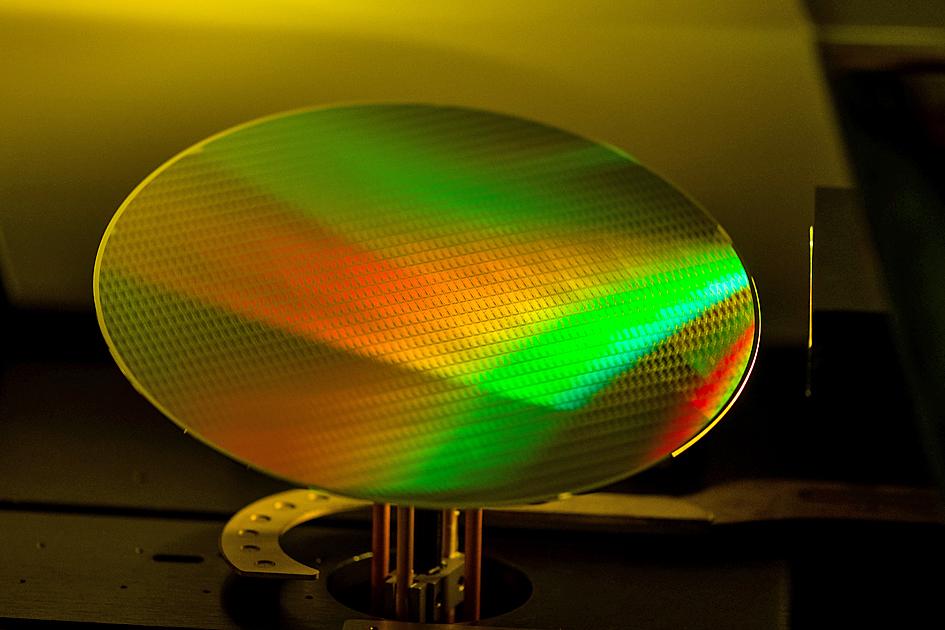Industries affected by a semiconductor shortage, from automakers to consumer electronics, might need to wait a little longer for components, as delays in filling orders continue to worsen.
Chip lead times, the gap between ordering a semiconductor and taking delivery, last month increased by seven days to 18 weeks from April, an indication that chipmakers’ struggles to keep up with demand are worsening, Susquehanna Financial Group said a report.
That gap, the longest wait time since the firm began tracking the data in 2017, is more than four weeks longer than the previous peak in 2018.

Photo: Bloomberg
Power management chips, semiconductors that regulate the flow of electricity in everything from industrial machinery to smartphones, are a primary reason for the overall increase.
Lead times for those chips hit 25.6 weeks, nearly two weeks longer than in April.
Still, the crunch is widespread.
“The broad-based nature of the shortages is highlighted by the data, as most key product categories (power management, discretes, analogs, passives) have seen LT [lead time] expansion,” Susquehanna analyst Chris Rolland wrote.
Investors watch lead times looking for clues about how demand is trending, but also as a sign that chip users might be panicking and ordering too much, which would mean the industry is headed for a glut.
That point has passed, Rolland said, adding that his concern is that there is not enough demand for the end devices that rely on the electronic components to support current ordering levels.
While overall lead times stretched for firms such as Broadcom Inc, NXP Semiconductors NV, STMicroelectronics NV and Texas Instruments Inc, some areas are beginning to catch up with demand.
Lead times for microcontrollers, small processors that direct functions in everything from vehicles to washing machines, decreased by more than one week, Rolland said.
Lead times for analog chips, devices that convert real-world phenomena such as touch and sound into electronic signals, increased, but at a slower pace than previously, Susquehanna data showed.
Optoelectronic components, including chips that help convert solar energy into electricity in solar panels, are increasingly difficult to find, the report said.
While most of the firms listed as struggling to keep up with orders count automakers as major customers, other areas have felt the pinch, too, with many electronics makers, including the biggest companies such as Apple Inc, unable to meet all of the demand for their products.

RECYCLE: Taiwan would aid manufacturers in refining rare earths from discarded appliances, which would fit the nation’s circular economy goals, minister Kung said Taiwan would work with the US and Japan on a proposed cooperation initiative in response to Beijing’s newly announced rare earth export curbs, Minister of Economic Affairs Kung Ming-hsin (龔明鑫) said yesterday. China last week announced new restrictions requiring companies to obtain export licenses if their products contain more than 0.1 percent of Chinese-origin rare earths by value. US Secretary of the Treasury Scott Bessent on Wednesday responded by saying that Beijing was “unreliable” in its rare earths exports, adding that the US would “neither be commanded, nor controlled” by China, several media outlets reported. Japanese Minister of Finance Katsunobu Kato yesterday also

Jensen Huang (黃仁勳), founder and CEO of US-based artificial intelligence chip designer Nvidia Corp and Taiwan Semiconductor Manufacturing Co (TSMC, 台積電) on Friday celebrated the first Nvidia Blackwell wafer produced on US soil. Huang visited TSMC’s advanced wafer fab in the US state of Arizona and joined the Taiwanese chipmaker’s executives to witness the efforts to “build the infrastructure that powers the world’s AI factories, right here in America,” Nvidia said in a statement. At the event, Huang joined Y.L. Wang (王英郎), vice president of operations at TSMC, in signing their names on the Blackwell wafer to

‘DRAMATIC AND POSITIVE’: AI growth would be better than it previously forecast and would stay robust even if the Chinese market became inaccessible for customers, it said Taiwan Semiconductor Manufacturing Co (TSMC, 台積電) yesterday raised its full-year revenue growth outlook after posting record profit for last quarter, despite growing market concern about an artificial intelligence (AI) bubble. The company said it expects revenue to expand about 35 percent year-on-year, driven mainly by faster-than-expected demand for leading-edge chips for AI applications. The world’s biggest contract chipmaker in July projected that revenue this year would expand about 30 percent in US dollar terms. The company also slightly hiked its capital expenditure for this year to US$40 billion to US$42 billion, compared with US$38 billion to US$42 billion it set previously. “AI demand actually

RARE EARTHS: The call between the US Treasury Secretary and his Chinese counterpart came as Washington sought to rally G7 partners in response to China’s export controls China and the US on Saturday agreed to conduct another round of trade negotiations in the coming week, as the world’s two biggest economies seek to avoid another damaging tit-for-tat tariff battle. Beijing last week announced sweeping controls on the critical rare earths industry, prompting US President Donald Trump to threaten 100 percent tariffs on imports from China in retaliation. Trump had also threatened to cancel his expected meeting with Chinese President Xi Jinping (習近平) in South Korea later this month on the sidelines of the APEC summit. In the latest indication of efforts to resolve their dispute, Chinese state media reported that